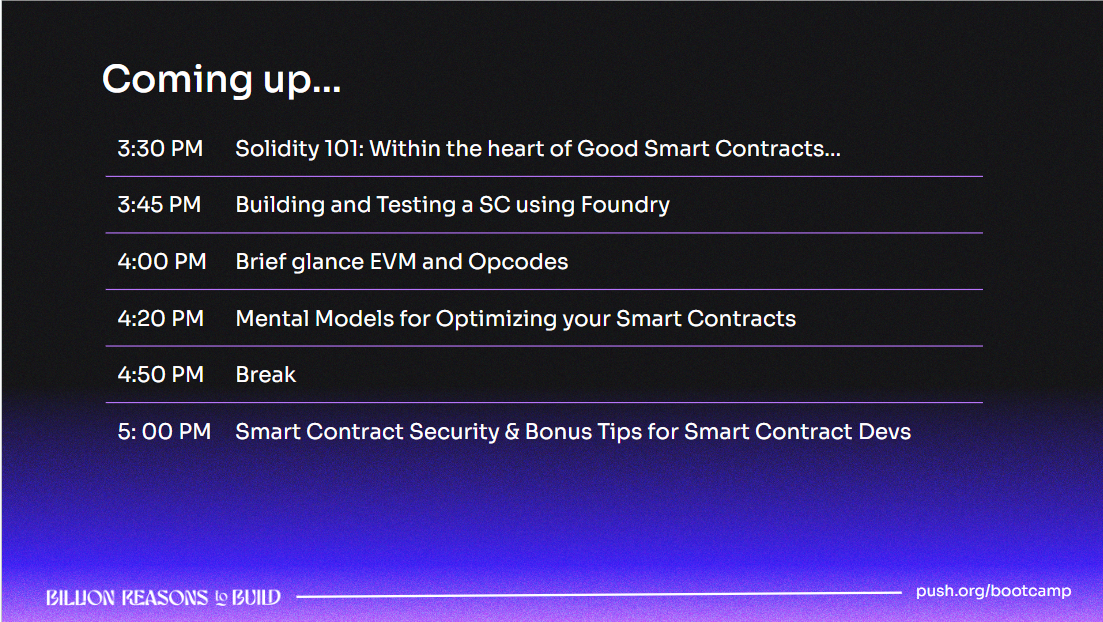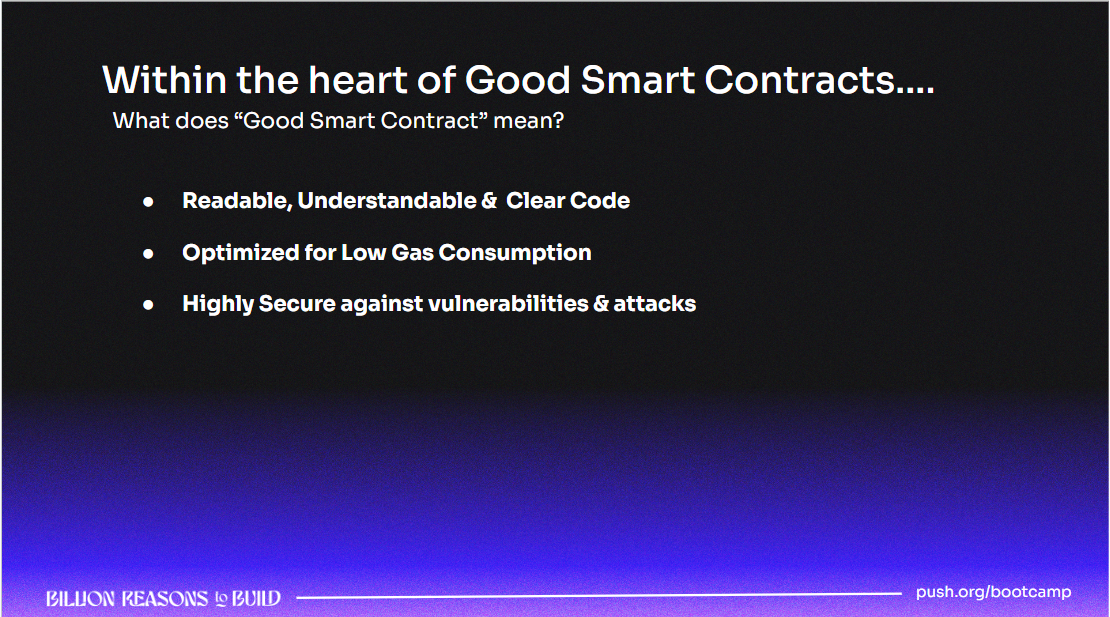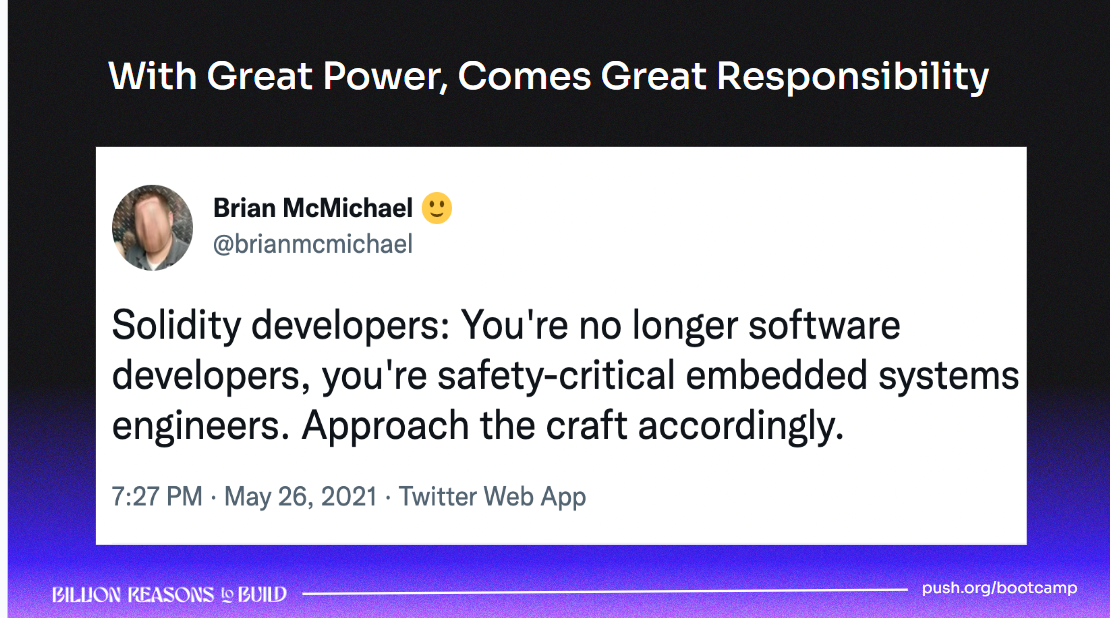BRB Bootcamp: Session 3 Advance Solidity
 Rajdeep Singha
Rajdeep Singha
Welcome to the detailed summary of Session 3 of the BRB Bootcamp! This session was packed with valuable insights and practical advice aimed at enhancing your skills in smart contract development .Whether you're a beginner or an experienced developer, the lessons from this session are crucial for building robust, efficient, and secure smart contracts. Let’s dive into the key topics and takeaways.
Overall Summary of the Session
Session 3 of the BRB Bootcamp focused on three main areas:
Best Practices for Smart Contract Development
Necessity of Smart Contract Security
Gas Optimization Techniques
Tools to Test Smart Contracts
The primary objective was to equip participants with the knowledge and tools to write high-quality smart contracts that are not only functional but also secure and efficient. Let's explore each of these areas in detail.

Best Practices to Follow
Write Clear and Maintainable Code
Use Descriptive Names: Variables, functions, and contract names should be descriptive enough to understand their purpose at a glance.
Comment Your Code: Well-documented code is easier to understand and maintain.
Modularize Your Code: Break down your code into smaller, reusable functions. This enhances readability and reduces redundancy.

Follow Solidity Style Guide
Adhere to the Solidity style guide to ensure your code is consistent and professional.
Use indentation, spacing, and naming conventions consistently.
Testing and Auditing
Regularly test your smart contracts using various scenarios to catch bugs early.
Consider third-party audits to identify potential vulnerabilities.
Necessity of Smart Contract Security
Importance of Security
Smart contracts, once deployed, cannot be easily changed. This immutability means that any security vulnerabilities can be catastrophic, leading to loss of funds and trust. Ensuring your smart contracts are secure is paramount.
Security Measures
Access Control: Implement robust access control mechanisms to prevent unauthorized interactions with your contract.
Use Libraries and Standards: Utilize well-established libraries and follow standards like OpenZeppelin to avoid reinventing the wheel and introducing bugs.
Regular Audits: Regularly audit your smart contracts, both through automated tools and manual reviews.
Gas Optimization Techniques
Why Optimize Gas Usage?
Gas costs are a significant part of deploying and using smart contracts on the Ethereum network. Efficient use of gas can save money and make your contract more attractive to users.
Optimization Techniques
Minimize Storage Operations: Storage operations are costly. Reduce the number of writes to the blockchain.
Use Efficient Data Types: Choose data types that use less gas. For instance, use
uint8instead ofuint256when possible.Batch Operations: Batch multiple operations into a single transaction to save gas.
Use
viewandpureFunctions: Functions that don’t modify the blockchain state should be marked asvieworpureto save gas.
Tools to Test Smart Contracts
Truffle
A development framework for Ethereum that provides a suite of tools for writing, testing, and deploying smart contracts. Truffle simplifies the testing process and integrates well with other Ethereum tools.
Hardhat
A flexible Ethereum development environment. Hardhat is known for its robustness and plugin system, allowing developers to customize their workflow and automate repetitive tasks.
Remix
An online IDE that offers a comprehensive suite of tools for writing, testing, debugging, and deploying smart contracts. Remix is particularly useful for beginners due to its user-friendly interface.
MythX
A security analysis service for Ethereum smart contracts. MythX integrates with development tools to provide real-time security analysis and vulnerability detection.
Ganache
A personal blockchain for Ethereum development. Ganache allows you to deploy contracts, develop applications, and run tests in a controlled environment.

Conclusion
Session 3 of the BRB Bootcamp was a deep dive into the essentials of smart contract development. By following best practices, prioritizing security, optimizing gas usage, and utilizing the right tools, you can significantly improve the quality and reliability of your smart contracts. These insights are not just theoretical; they are practical steps that can make a tangible difference in your development process. Keep coding, stay secure, and optimize wisely!
Subscribe to my newsletter
Read articles from Rajdeep Singha directly inside your inbox. Subscribe to the newsletter, and don't miss out.
Written by
